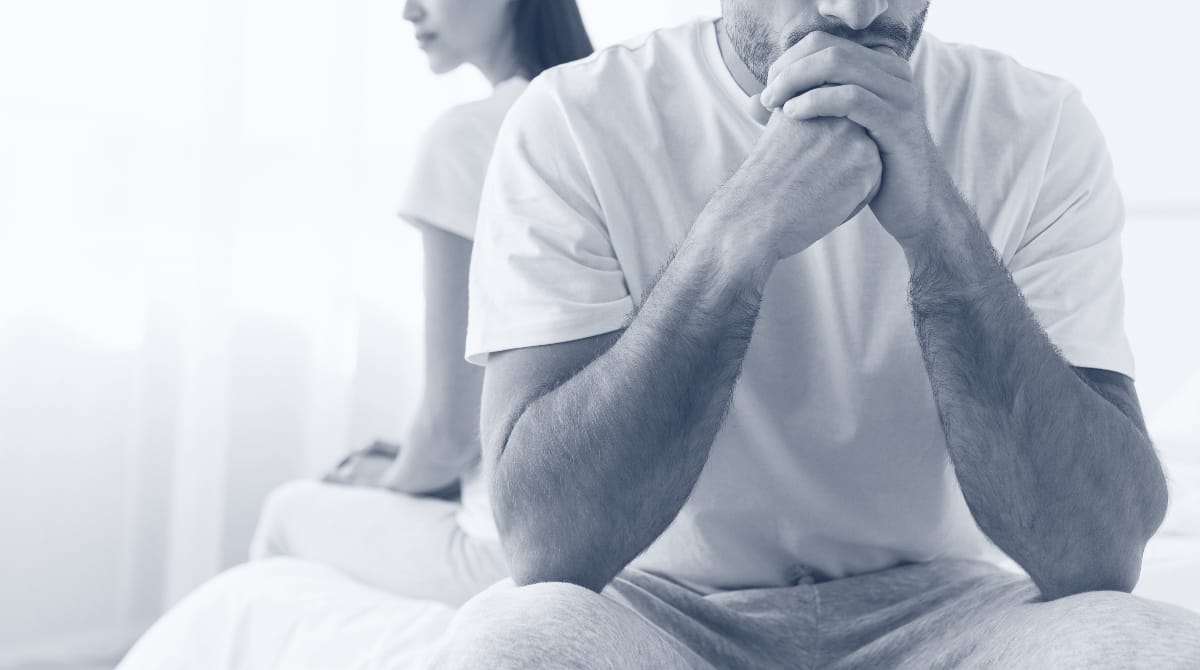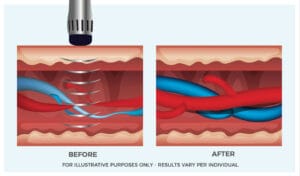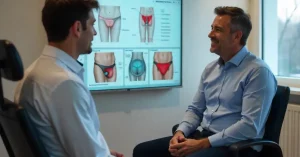Yes. It can. Low testosterone, often known as low T, and erectile dysfunction (ED) are two conditions that may hurt a man’s sexual health, but the link between them isn’t as clear as many people think.
Low testosterone may create sexual health problems, although it isn’t necessarily the main reason for ED. In this article, we go into depth regarding the link between low testosterone and ED, the reasons behind low T, and the therapy choices that may help men deal with this issue in the best way possible.
What Is Low Testosterone and ED?
Testosterone is a hormone that drives male sexual development, libido, and overall energy levels. Low T, or male hypogonadism, occurs when the body doesn’t produce enough testosterone, leading to symptoms like reduced sex drive, fatigue, weight gain, and sometimes ED.
Erectile dysfunction refers to the inability to achieve or maintain an erection suitable for sexual activity. While low T can influence sexual desire, ED often stems from other factors affecting blood flow, nerves, or psychological health.
Does Low Testosterone Cause ED?
There is a complicated relationship between low testosterone and ED. In certain circumstances, low T may lead to ED, although it’s not always the case. Studies reveal that around one in three men with ED may also have low testosterone. However, many men with low T may still have erections, and individuals with normal testosterone levels might nonetheless have ED. (Martinez 2020)
Testosterone helps make you sexually aroused by making the central nervous system produce chemicals like dopamine and nitric oxide, which help cause erections. It also helps the spinal nerves work better, which improves blood flow to the penis. But they may not immediately induce ED unless testosterone levels are very low.
Less blood supply to the penis is a typical cause of ED. This is generally related to long-term health problems such as high blood pressure, high cholesterol, heart disease, or diabetes.
Stress, depression, anxiety, and problems with relationships are some of the psychological elements that may also be quite important. Neurological diseases like multiple sclerosis or spinal cord injuries, as well as lifestyle variables like being overweight, may make ED worse. Low testosterone may be related to these illnesses since it is connected to risk factors including weight gain, diabetes, and heart disease, which may make ED worse in an indirect way.
Prevalence of Low Testosterone in MO, USA?
While there are no specific data on the prevalence of low testosterone in males of the Missouri region, it is estimated that about 2 men in every 100 have low testosterone.
This condition has a prevalence of about 20% among adolescent and young adult males aged 15-39 years old. This prevalence is particularly concerning given that low testosterone can significantly impact quality of life, energy levels, and overall well-being in men across all age groups.
Can Testosterone Therapy Help?
Testosterone replacement therapy (TRT) is often considered for men with low T, but it’s not a guaranteed fix for ED. TRT is more effective at restoring libido and improving mood, which can renew interest in sex, than directly resolving ED.
For men with normal testosterone levels, TRT is unlikely to help with erections. Many men on TRT still need ED medications like sildenafil (Viagra), tadalafil (Cialis), avanafil (Stendra), or vardenafil (Levitra) to improve blood flow to the penis.
Studies suggest that combining TRT with these PDE-5 inhibitors can be more effective for men with both low T and ED than using either treatment alone. However, some research indicates that erection improvements from TRT may not last long-term. (McMillen 2024)
TRT also comes with risks, including acne, testicle shrinkage, and enlarged breasts. Its long-term safety and effectiveness are still under study, so it’s critical to consult a doctor before starting treatment.
Treating ED often requires addressing its root causes. In addition to medications like PDE-5 inhibitors, options include injections (e.g., alprostadil), penis pumps, penile implants, or counseling to manage psychological factors.
Lifestyle changes, such as regular exercise and a healthy diet, can boost testosterone levels naturally, especially for overweight or obese men, while also improving blood flow and reducing ED risk.
Who Provides the Best Treatment for Low Testosterone in MO, USA?
St. Peter’s Men’s Clinic Center is undoubtedly the best place for getting treatment for low testosterone in MO, USA. Unlike other clinics that may cut corners, St. Peters Men’s Clinic ensures thorough evaluation and ongoing monitoring throughout your treatment journey.
Our licensed medical providers don’t just treat symptoms. We address the underlying issues causing your low testosterone levels. From initial consultation to follow-up care, we maintain the highest standards of medical excellence that have made us Missouri’s premier destination for men’s hormone optimization.
How to Get Help
Men experiencing low testosterone or ED should speak with a healthcare provider to identify underlying causes. Blood tests and examinations can pinpoint whether low T or other factors are contributing to sexual health issues.
For personalized care, you can get help from our St. Peter’s Men’s Clinic Center by booking an appointment TODAY to discuss symptoms and explore tailored treatment options.






